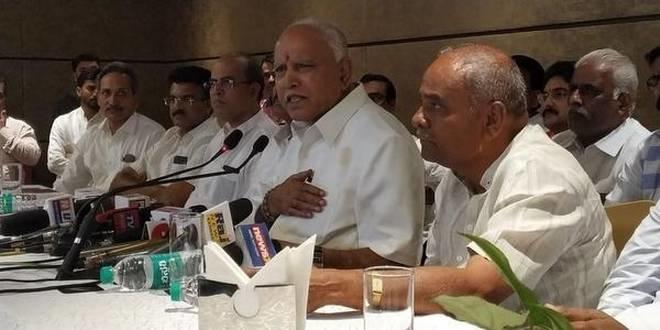After Karnataka, Is BJP closer to Achieving ‘Congress-mukt Bharat’?

Many would regard the politics that unfolded in Karnataka over the last one week as a representation of the ‘theatre of the absurd’. Maybe, they need to hold their breath. The last seven days mark the end of only one more scene in this unfolding drama. Quite possibly, the venerable legislators of Karnataka are conspiratorially whispering to one another, ‘Picture abhi baaki hai, mere dost—this film is still not over my friend.’
The collapse of the Congress-Janata Dal (Secular), or JDS, coalition government headed by HD Kumaraswamy was imminent for quite some time. An alliance that had come together to keep the Bharatiya Janata Party (BJP) out of power on the one hand, and enjoy the benefits of power on the other, was bound to crumble.
At one level, it was inevitable that mutual contradictions between the alliance partners would result in the crisis that everybody witnessed. The internal bickering within the two parties did the rest of the job. The last straw that broke the camel’s back was the humiliating defeat that the alliance suffered in the 2019 Lok Sabha elections in the state. Then onward, it seemed only a matter of time before the government fell.
The internal bickering within the alliance was exploited to the hilt by the BJP. The resignations of the Members of Legislative Assembly (MLAs) of the ruling alliance virtually signalled the beginning of the countdown to the resignation of the Kumaraswamy government.
In the past three decades, whenever Karnataka has had an Assembly with no clear majority for a single party (this has happened in 2004, 2008 and 2018), one has seen short-lived governments, political poll-vaults by independent legislators and resignations by MLAs who decide to switch sides.
On all such occasions, the state government (and its chief ministers) have been at the mercy of a few legislators who choose to extract the maximum political advantage from the situation. It is for this reason that even if BJP leader and former chief minister BS Yeddyurappa were to form the government now, the sordid political gymnastics of the recent past could well repeat itself in the coming days.
Given the composition of the present Assembly, any BJP government formed by Yeddyurappa could well be subject to pressure from independent legislators and the “new converts”. They will, of course, demand—and possibly get—more than their share of political benefits. A senior BJP leader put it quite poignantly: “We seem to give more importance to the new daughters-in-law rather than the ones who are well established in our homes!”
The next few days would decide whether the BJP is privileging short- term advantages or eyeing long-term gains. If it is the first, then it would form the government in Karnataka unmindful of the consequences or compromises that forming such a government would entail. If the long-term agenda wins the day, then one may see Karnataka headed for a spell of President’s rule followed by a fresh election.
Given the way the Congress-JDS coalition functioned, especially when it was in the ICU chamber towards the end, it would win very little sympathy and could even face an erosion of support. Surveys done around the Lok Sabha elections indicated that if the state had a snap poll, the BJP would do very well. Developments since then only appear to strengthen their chances of doing well. Coming to power after an election would also give the BJP more manoeuvrability with respect to choosing a leadership in the state. It will be interesting to see which option wins the day within the party.
What the developments in Karnataka mean for Congress and JDS is another matter. Congress has been in an obvious state of flux in Karnataka ever since it lost the 2018 Assembly elections, securing only 80 of the 224 seats. The internal turf war in the party came out in the open thereafter. No effort was made to resolve this or to forge a semblance of unity in the state unit of the party.
Thereafter, winning only one of the state’s 28 Lok Sabha seats should have rung the alarm bell loud and clear for Congress. Yet, the party continues to be so preoccupied in determining who should be its president that little attention is being given to the party that the new president will lead. This leadership crisis explains similar developments in Goa, the bickering in the Madhya Pradesh and Rajasthan Congress units continue and, of course, the exodus of MLAs from the Karnataka Congress. The Congress is undoubtedly helping the BJP achieve its dream of a Congress-mukt Bharat, or India devoid of a Congress party.
After these developments, the Janata Dal-Secular could well be pushed further to the margins and relegated to a distant third player in the state’s politics. Murmurs in the party against the control and domination of the family of HD Deve Gowda, the national president of JDS, may well come out in the open and further dent its image and prospects.
The failure of the coalition experiment in Karnataka has implications not just for the state but could have a ripple effect across the country. In its effort to emerge as the dominant party in India, the BJP may use every opportunity that the Congress provides to expand its political presence. This is especially true of states where the two parties face each other in direct electoral contests. This will make developments in Karnataka over the coming months, crucial to the emerging national picture.
Sandeep Shastri is Pro Vice-Chancellor, Jain University and national coordinator, Lokniti. The views are personal.
Get the latest reports & analysis with people's perspective on Protests, movements & deep analytical videos, discussions of the current affairs in your Telegram app. Subscribe to NewsClick's Telegram channel & get Real-Time updates on stories, as they get published on our website.
























